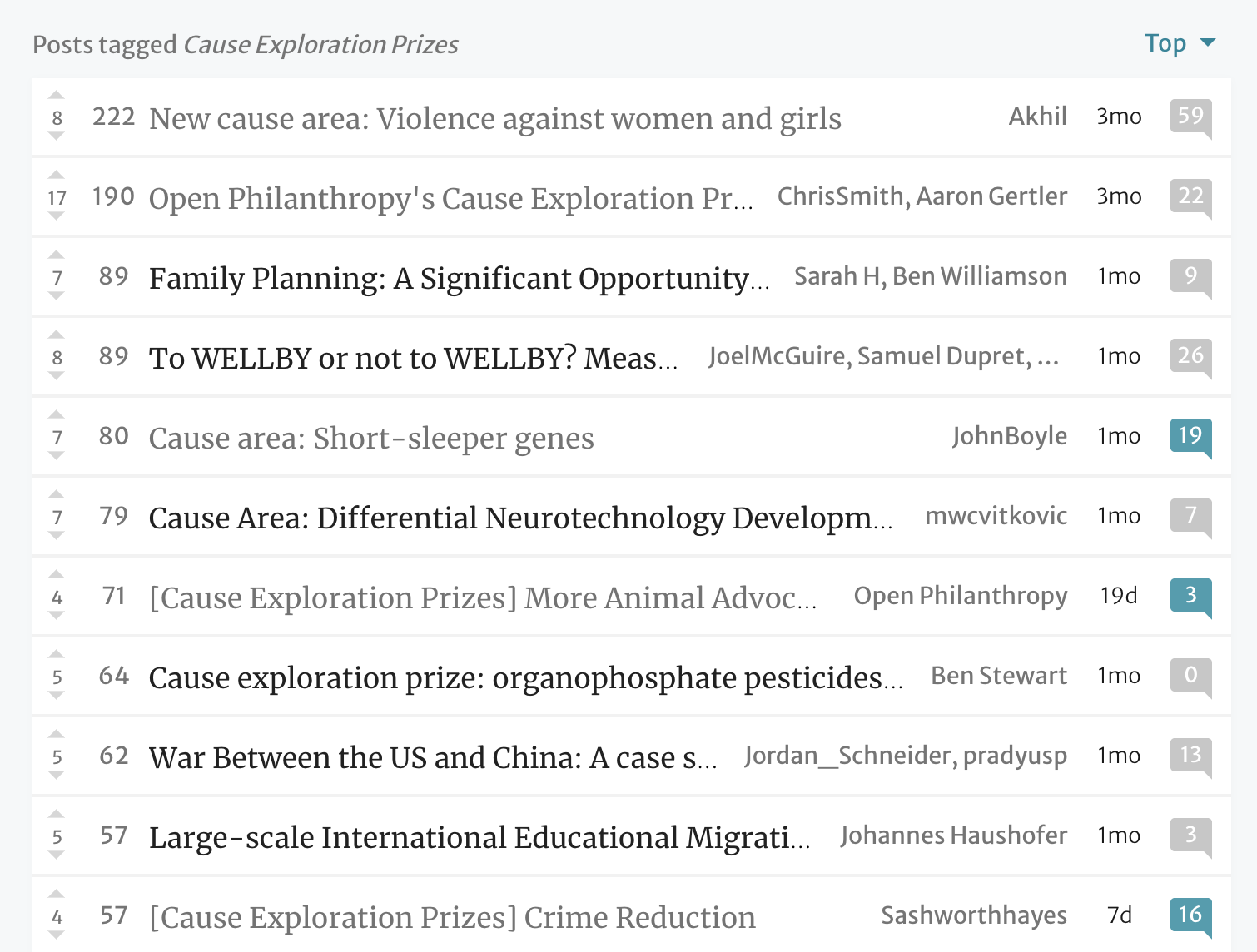We were gratified to receive over 150 good-faith submissions to Open Philanthropy’s Cause Exploration Prizes, where we invited people to suggest a new area for us to support or respond to our suggested questions. We hoped that these submissions would help us find new ways to carry out our mission — helping others as much as possible with the resources available to us.
You can read them on the EA Forum. Below, we highlight the submissions to which we are awarding major prizes and honorable mentions.
We’re awarding these prizes to entries that we thought engaged well with our prompts and helped us to better understand the questions and issues they addressed. We have not investigated each and every claim made in these entries, and the awarding of a prize does not imply that we necessarily endorse their claims or arguments as correct.
Our top prize
We are awarding our top prize ($25,000) to: Organophosphate pesticides and other neurotoxicants by Ben Stewart.
Second prizes
We are awarding three second-place prizes ($15,000) for the following submissions. These are listed in no particular order.
- Violence against women and girls by Akhil
- Sickle Cell Disease by anonymous
- Shareholder activism by sbehmer
Honorable mentions
We are awarding $500 to the authors of the following entries. These are listed in no particular order.
- Expanding access to infertility services in Low- and Middle-Income Countries by Soleine Scotney
- Maternal morbidity by alexhill
- Farmed Animal Welfare in Sub-Saharan Africa by anonymous
- Indoor Air Quality to Reduce Infectious Respiratory Disease by Gavriel Kleinwaks, Alastair Fraser-Urquhart, and joshcmorrison
- To WELLBY or not to WELLBY? Measuring non-health, non-pecuniary benefits using subjective wellbeing by JoelMcGuire, Samuel Dupret, and MichaelPlant
- Tobacco harm reduction by kristof
- Climate adaptation in low-income countries by Karthik Tadepalli
- Social and behavioral science R&D by Anna Harvey and Stuart Buck
- Family Planning: A Significant Opportunity for Impact by Sarah H and Ben Williamson
- Improving diagnosis and treatment of bipolar spectrum disorders by Karolina Soltys
- War between the US and China: A case study for epistemic challenges around China-related catastrophic risk by Jordan_Schneider and pradyusp
- Improved quality control in science by Sophie Schauman
- More animal advocacy R&D by anonymous
- Adapting to Extreme Heat Exposure in South Asia by Surbhi B
- Rich to Poor Country Spillovers by anonymous
- Large-scale International Educational Migration: A shallow investigation by Jasmin Baier, Johannes Haushofer, and Hannah Lea Shaw
- Training health workers to prevent newborn deaths by Marshall
- Developmental Cognitive Neuroepidemiology by Hauke Hillebrandt
- Differential Neurotechnology Development by mwcvitkovic
- Short sleeper genes by JohnBoyle
We are contacting all prize recipients by email.
Good-faith submissions
Next week we will begin the process of emailing everyone who submitted a good-faith submission in order to offer them participation awards of $200.
Future plans
As we stated in our announcement, this was a trial process for us. We’re grateful to those who sent us feedback and suggestions for how to improve. At this stage, we don’t know if or when we will repeat a process like this. We might write a public update later this year on what we have learned from this exercise and any plans to repeat this or a similar exercise again.
Thank you
We are grateful to Lizka and the other operators of the EA Forum, and to everyone who engaged with or submitted an entry to the Cause Exploration Prizes for making this possible.





This was a great event which I followed very closely indeed. It generated so much interesting exploration of different areas and I learned so much about the world I live in.
I just want to add that the idea of having 'good-faith' submission prizes was a fantastic addition, and really helped level the playing field for people who otherwise might not have been able to contribute. I heard from a couple of people that they may not have been able to submit without them. I'd love to see more of these in similar contests in future.